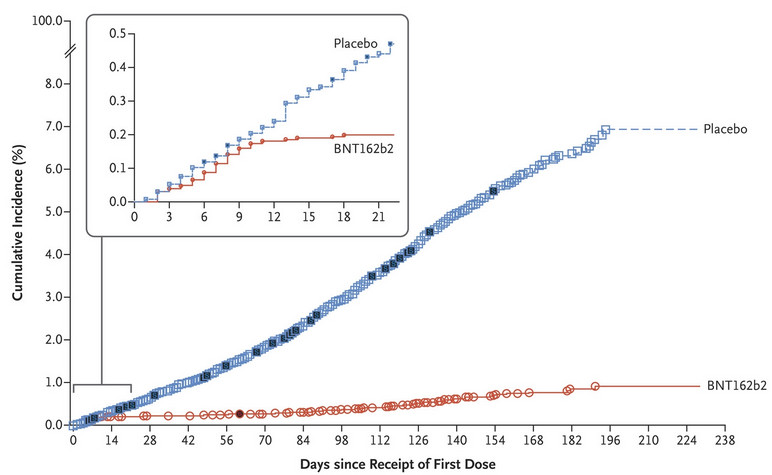
23 September 2021

This graph from a paper published last week in the New England Journal of Medicine by Stephen Thomas and colleagues shows how effective the Pfizer vaccine is at preventing Covid. While one dose is much less effective than two, even after one dose there is a benefit. There is also not the slightest shred of evidence that people are at greater risk of Covid immediately after getting their first shot.
A South African news site, Biznews, that has become notorious for promoting misinformation about Covid has published an article that makes numerous misleading and false claims.
Biznews is not a member of the South African Press Council and therefore not subject to press ombudsman complaints or rulings.
The Biznews article explicitly states that immediately after being vaccinated with the first dose people are placed at greater risk of contracting Covid. The article specifically mentions the Pfizer and AstraZeneca vaccines in this regard. (Since the Pfizer vaccine is being used in South Africa, we deal only with that here.)
The claim is nonsense and it is firmly debunked by a study published in the world’s leading medical journal, the New England Journal of Medicine, last week. The study authors are the scientists who tested the BioNTech/Pfizer vaccine. This is the most widely used vaccine in South Africa. The study presents the six-month data of the clinical trial that found this vaccine to be safe and effective.
The Pfizer vaccine protocol involves having two doses several weeks apart.
The trial volunteers were randomly divided into two nearly equally sized groups: those who got the vaccine and those who got a placebo (a harmless substance that does nothing).
Between the first and second dose on the trial, 110 people on the placebo contracted Covid versus 46 vaccine recipients. This is a first dose vaccine efficacy of 58%. It’s not nearly as effective as efficacy after the second dose but it thoroughly debunks the myth that after the first shot you’re at greater risk of Covid.
Moreover, 30 of the 31 people on the trial who got severe Covid were in the placebo group. This thoroughly refutes the idea that you’re more at risk of Covid after your first dose.
Another important finding from the study was that vaccine efficacy against Covid was over 91% through six months of follow-up, albeit that there was a gradual decline in vaccine efficacy with time. “Vaccine efficacy against severe disease was 96.7%” the paper states. In South Africa, the vaccine was 100% effective over the duration of the study, though this was while the beta variant was dominant. Since then, the delta variant has become dominant here.
The authors concluded: “Through 6 months of follow-up and despite a gradual decline in … efficacy, [the vaccine] had a favourable safety profile and was highly efficacious in preventing Covid-19.”
Watch this video which explains how we know if vaccines and medicines are safe and effective: